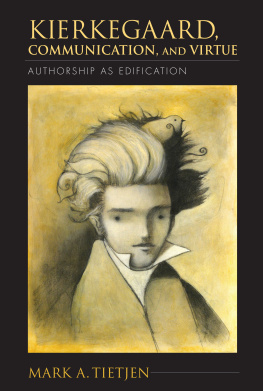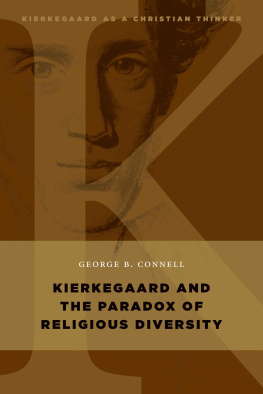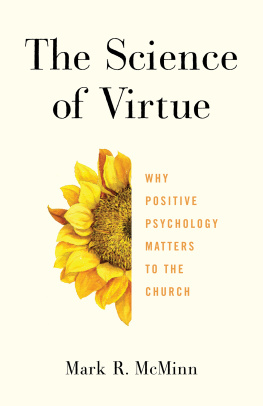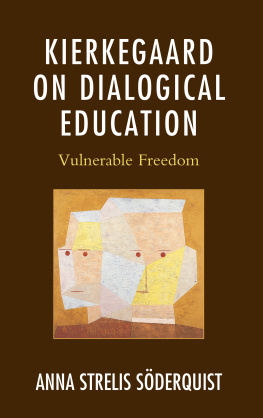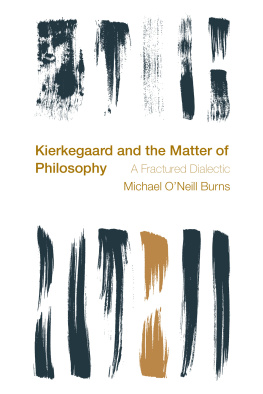Mark A. Tietjen - Kierkegaard, Communication, and Virtue
Here you can read online Mark A. Tietjen - Kierkegaard, Communication, and Virtue full text of the book (entire story) in english for free. Download pdf and epub, get meaning, cover and reviews about this ebook. year: 2019, genre: Religion. Description of the work, (preface) as well as reviews are available. Best literature library LitArk.com created for fans of good reading and offers a wide selection of genres:
Romance novel
Science fiction
Adventure
Detective
Science
History
Home and family
Prose
Art
Politics
Computer
Non-fiction
Religion
Business
Children
Humor
Choose a favorite category and find really read worthwhile books. Enjoy immersion in the world of imagination, feel the emotions of the characters or learn something new for yourself, make an fascinating discovery.
- Book:Kierkegaard, Communication, and Virtue
- Author:
- Genre:
- Year:2019
- Rating:3 / 5
- Favourites:Add to favourites
- Your mark:
- 60
- 1
- 2
- 3
- 4
- 5
Kierkegaard, Communication, and Virtue: summary, description and annotation
We offer to read an annotation, description, summary or preface (depends on what the author of the book "Kierkegaard, Communication, and Virtue" wrote himself). If you haven't found the necessary information about the book — write in the comments, we will try to find it.
Kierkegaard, Communication, and Virtue — read online for free the complete book (whole text) full work
Below is the text of the book, divided by pages. System saving the place of the last page read, allows you to conveniently read the book "Kierkegaard, Communication, and Virtue" online for free, without having to search again every time where you left off. Put a bookmark, and you can go to the page where you finished reading at any time.
Font size:
Interval:
Bookmark:
KIERKEGAARD, COMMUNICATION,
AND VIRTUE
INDIANA SERIES IN THE PHILOSOPHY OF RELIGION
Merold Westphal, Editor
KIERKEGAARD,
COMMUNICATION,
AND VIRTUE
Authorship as Edification
Mark A. Tietjen
Indiana University Press
Bloomington and Indianapolis
This book is a publication of
Indiana University Press
601 North Morton Street
Bloomington, Indiana 474043797 USA
iupress.indiana.edu
| Telephone orders | 800-842-6796 |
| Fax orders | 812-855-7931 |
2013 by Mark A. Tietjen
All rights reserved
No part of this book may be reproduced or utilized in any form or by any means, electronic or mechanical, including photocopying and recording, or by any information storage and retrieval system, without permission in writing from the publisher. The Association of American University Presses Resolution on Permissions constitutes the only exception to this prohibition.
The paper used in this publication meets the minimum requirements of the American National Standard for Information SciencesPermanence of Paper for Printed Library Materials, ANSI Z39.481992.
Manufactured in the United States of America
Library of Congress Cataloging-in-Publication Data
Tietjen, Mark A.
Kierkegaard, communication, and virtue :
authorship as edification / Mark A. Tietjen.
pages cm. (Indiana series in the philosophy of religion)
Includes bibliographical references and index.
ISBN 978-0-253-00854-1 (cloth : alk. paper) ISBN 978-0-253-00862-6 (pbk. : alk. paper) ISBN 978-0-253-00871-8 (ebook) 1. Kierkegaard, Sren, 1813-1855. I. Title.
B4377.T54 2013
198.9dc23
2013002203
1 2 3 4 5 18 17 16 15 14 13
Contents
Acknowledgments
T HIS BOOK is a result of the confluence of many lives commonly pursuing the joys of learning and friendship. I should first thank James Loder, who introduced me to the thought of Kierkegaard and whose powerful influence on several generations of students and ministers at Princeton Theological Seminary continues to this day. My interest in Kierkegaard led me to Baylor University, in large part because of its 2012 vision that would attract two Kierkegaard scholars, Robert Roberts and Stephen Evans. Their knowledge and especially their wisdom have been essential to my maturation as a philosopher and as a person. I am grateful also to Margaret Watkins, Michael Foley, and John Davenport, who made available to me their expertise. In 2005 and in 2010 I was privileged to receive summer fellowships from the Hong Kierkegaard Library at St. Olaf College, and much of the work in this book was begun while at St. Olaf, with the kind and generous support of Gordon Marino and Cynthia Lund. Thanks also go to my colleagues in the Philosophy Program at the University of West Georgia and to George Kieh, from whom I received a College of Arts and Sciences Faculty Research Grant that enabled further research.
There are many othersgraduate student colleagues at Baylor, commentators at conferences, West Georgia undergraduateswhose interaction has in different ways contributed to the development of the ideas in this book. I am grateful in particular to my good friend Zach Manis, who has over the years read earlier versions of chapters of the book and always offered thoughtful feedback. Roberts Perkins, editor of the International Kierkegaard Commentary series from which some of the material in this book is reprinted, has served as a kind of mentor to me, as he has to so many young Kierkegaard scholars. Sylvia Walsh improved this manuscript first by pointing me to Kierkegaards lectures on communication and second, along with Merold Westphal, by reviewing this manuscript for Indiana. Along with Merold, both Dee Mortensen and Sarah Jacobi of Indiana University Press have in a most competent and patient way guided me in the process of taking a manuscript and making a book.
The broader story of my journey to Kierkegaard is the story of my life, and those positive influences are far too many to enumerate. Let me briefly acknowledge my entire family, especially my parents, Tom and Alice, whose lives and words have edified me all along the way, and my wife, Amy, who, like so many spouses, endured much trouble and inconvenience to see me flourish. She has been most supportive and gracious.
Finally, I would like to express gratitude to the editors and publishers who have granted permission to reprint in revised forms and portions the following articles and book chapters:
To Believe or Not to Believe: Toward a Hermeneutic of Trust, in International Kierkegaard Commentary, vol. 22: The Point of View, ed. Robert L. Perkins (Macon, GA: Mercer University Press, 2010), 78103.
Kierkegaard and the Classical Virtue Tradition, Faith and Philosophy 27:2 (April 2010): 15373.
Indirect Communication, and the Special Case of Christian Communication, in Kierkegaard and Christianity (Acta Kierkegaardiana, vol. 3), ed. Andrew Burgess, Abraham Khan, Roman Krlik, Peter ajda, and Jamie Turnbull (Toronto: University of Toronto Press, 2008), 21828.
What The Book on Adler Can Teach about the Author and the Authorship, in International Kierkegaard Commentary, vol. 24: The Book on Adler, ed. Robert L. Perkins (Macon, GA: Mercer University Press, 2008), 97120.
Sigla
| AN | Armed Neutrality . See PV. |
| BA | The Book on Adler . Edited and translated by Howard V. Hong and Edna H. Hong. Princeton: Princeton University Press, 1998. |
| CA | The Concept of Anxiety . Edited and translated by Reidar Thomte. Princeton: Princeton University Press, 1980. |
| CD | Christian Discourses and The Crisis and a Crisis in the Life of an Actress . Edited and translated by Howard V. Hong and Edna H. Hong. Princeton: Princeton University Press, 1997. |
| CI | The Concept of Irony with Continual Reference to Socrates . Edited and translated by Howard V. Hong and Edna H. Hong. Princeton: Princeton University Press, 1989. |
| COR | The Corsair Affair . Edited and translated by Howard V. Hong and Edna H. Hong. Princeton: Princeton University Press, 1982. |
| CUP | Concluding Unscientific Postscript to Philosophical Fragments. Edited and translated by Howard V. Hong and Edna H. Hong. Princeton: Princeton University Press, 1992. |
| EO | Either/Or (2 vols.) . Edited and translated by Howard V. Hong and Edna H. Hong. Princeton: Princeton University Press, 1987. |
| EUD | Eighteen Upbuilding Discourses . Edited and translated by Howard V. Hong and Edna H. Hong. Princeton: Princeton University Press, 1990. |
| FSE | For Self-Examination; Judge for Yourself! Edited and translated by Howard V. Hong and Edna H. Hong. Princeton: Princeton University Press, 1990. |
| FT | Fear and Trembling . Edited by C. Stephen Evans and Sylvia Walsh. Translated by Sylvia Walsh. Cambridge: Cambridge University Press, 2006. |
| JFY | Judge for Yourself! See FSE. |
| JP | Sren Kierkegaards Journals and Papers (7 vols.) . Edited and translated by Howard V. Hong and Edna H. Hong. Bloomington: Indiana University Press, 196778. |
| OMWA | On My Work as an Author . See PV. |
| P | Prefaces; Writing Sampler . Edited and Translated by Todd W. Nichol. Princeton: Princeton University Press, 1997. |
| PC | Practice in Christianity . Edited and translated by Howard V. Hong and Edna H. Hong. Princeton: Princeton University Press, 1991. |
Font size:
Interval:
Bookmark:
Similar books «Kierkegaard, Communication, and Virtue»
Look at similar books to Kierkegaard, Communication, and Virtue. We have selected literature similar in name and meaning in the hope of providing readers with more options to find new, interesting, not yet read works.
Discussion, reviews of the book Kierkegaard, Communication, and Virtue and just readers' own opinions. Leave your comments, write what you think about the work, its meaning or the main characters. Specify what exactly you liked and what you didn't like, and why you think so.

